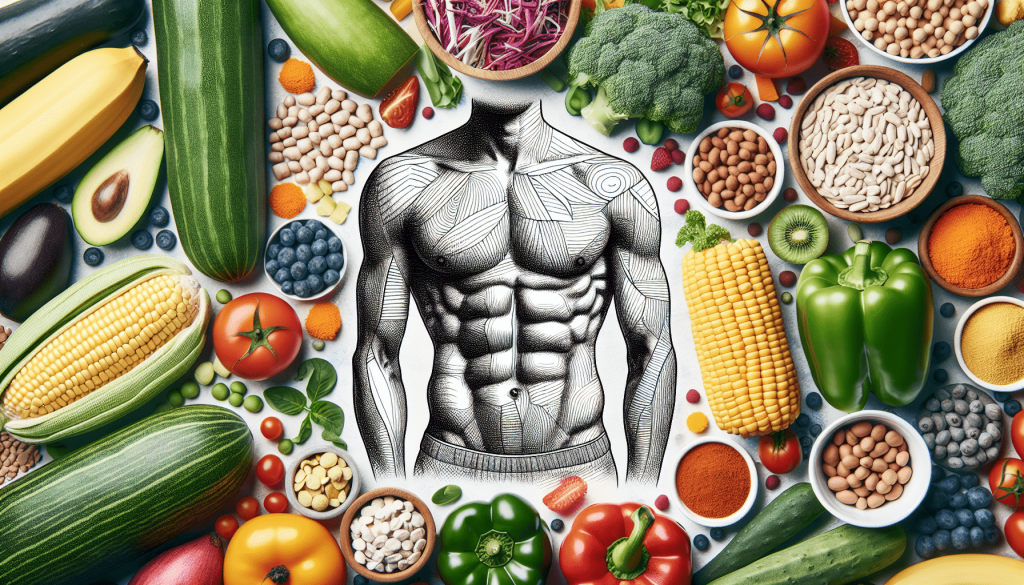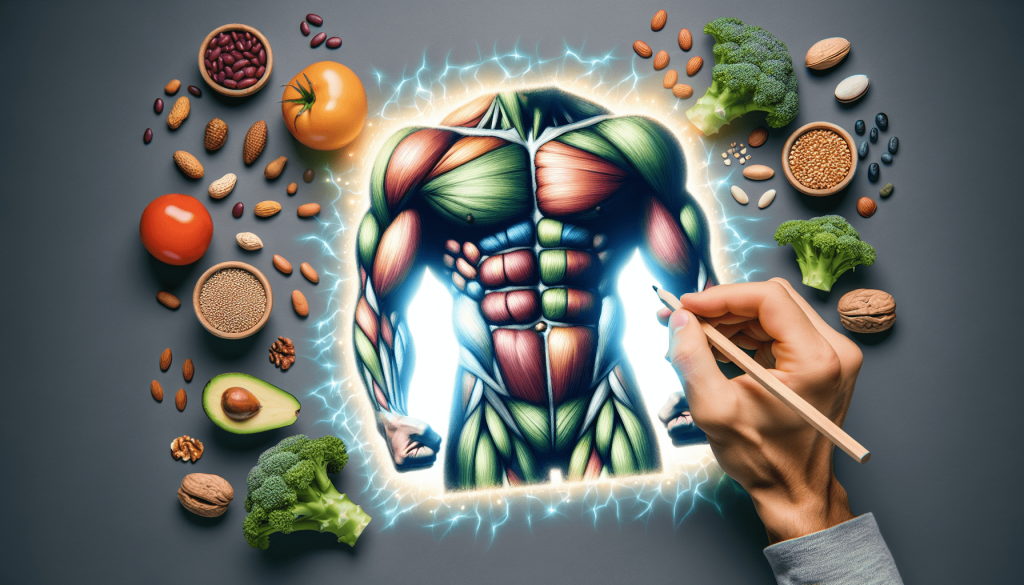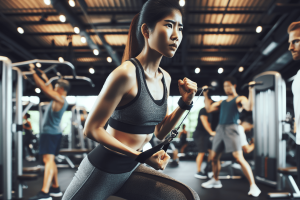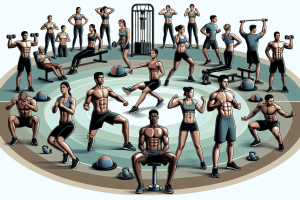If you’ve ever wondered whether a vegetarian or vegan diet can help you achieve those elusive six-pack abs and build strong core muscles, then look no further. In this article, we’ll explore the question of whether adopting a plant-based diet can support the development of a chiseled midsection. Whether you’re a seasoned vegetarian or vegan, or simply curious about the potential fitness benefits of these dietary choices, we’ll provide you with the answers and insights you need to embark on your journey towards a sculpted physique.
Introduction
Welcome to the article on how a vegetarian or vegan diet can support six-pack development! Many people believe that achieving a six-pack requires consuming copious amounts of meat and animal-based products. However, this is simply not the case. With the right knowledge and understanding, you can develop and maintain a strong, defined core on a vegetarian or vegan diet. In this article, we will explore the key nutrients needed for six-pack development, delicious plant-based protein sources, effective meal planning, the role of supplements, and the numerous benefits of a vegetarian or vegan diet for achieving your six-pack goals.
Understanding Six-Pack Development
What is a six-pack?
A six-pack refers to the visible abdominal muscles that create a defined, sculpted appearance. These muscles, specifically the rectus abdominis, are responsible for flexing and stabilizing the trunk. Developing a six-pack requires reducing body fat percentage and strengthening the abdominal muscles.
How are six-pack abs developed?
Developing six-pack abs involves two main components: reducing body fat percentage and strengthening the underlying abdominal muscles. While exercise plays a crucial role in building abdominal muscles, nutrition is equally important in achieving a visible six-pack. A combination of targeted exercise, proper nutrition, and a overall healthy lifestyle are essential for attaining your desired results.
Importance of nutrition in six-pack development
Nutrition plays a vital role in both reducing body fat percentage and building strong, defined abdominal muscles. In order to reveal the abdominal muscles, a low body fat percentage is necessary. This requires consuming a well-balanced diet that provides adequate nutrients and energy while still creating a calorie deficit. Additionally, the right combination of nutrients, such as protein, vitamins, and minerals, is essential for muscle growth and repair.
Vegetarian and Vegan Diets
Overview of vegetarian and vegan diets
A vegetarian diet includes plant-based foods such as fruits, vegetables, legumes, nuts, seeds, and grains, while excluding meat and fish. On the other hand, a vegan diet excludes all animal products, including dairy and eggs. Both vegetarian and vegan diets offer numerous health benefits and can provide all the necessary nutrients for six-pack development.
Key nutrients found in plant-based foods
Plant-based foods are abundant in essential nutrients that support muscle development and overall health. Fruits and vegetables are rich in antioxidants and vitamins, such as vitamin C and vitamin E, which aid in muscle repair and recovery. Legumes, such as lentils and chickpeas, are excellent sources of protein, fiber, and iron. Nuts and seeds provide healthy fats, protein, and important vitamins and minerals.
Protein Sources for Vegetarians and Vegans
Plant-based protein sources
Contrary to the misconception that vegetarians and vegans lack protein, there are plenty of plant-based protein sources available. Legumes, such as lentils, beans, and chickpeas, are excellent sources of protein. Soy products like tofu, tempeh, and edamame are also protein-rich options. Other plant-based sources include quinoa, hemp seeds, chia seeds, and seitan. Incorporating a variety of these protein sources into your diet can ensure an adequate protein intake for muscle growth and recovery.
Combining plant-based proteins for optimal intake
While individual plant-based protein sources may not provide all the essential amino acids found in animal proteins, combining different plant-based proteins can create a complete amino acid profile. For example, combining legumes with whole grains, such as brown rice or quinoa, creates a complementary mix of amino acids. By incorporating a variety of protein sources and practicing food combining, you can easily meet your protein needs on a vegetarian or vegan diet.
Essential Nutrients for Six-Pack Development
Calcium and Vitamin D
Calcium and vitamin D play an important role in bone health, muscle function, and overall performance. While dairy products are traditional sources of these nutrients, there are plenty of plant-based options available. Leafy green vegetables like kale, collard greens, and spinach are high in calcium. Additionally, fortified plant-based milk alternatives, like almond milk or soy milk, can provide adequate amounts of calcium and vitamin D.
Iron and Zinc
Iron is crucial for oxygen transport and energy production, while zinc supports immune function and muscle growth. Plant-based sources of iron include legumes, leafy greens, tofu, quinoa, and fortified cereals. Zinc can be obtained from whole grains, nuts, seeds, legumes, and tofu. By incorporating a diverse range of plant-based foods, you can easily meet your iron and zinc requirements.
Omega-3 Fatty Acids
Omega-3 fatty acids are essential for reducing inflammation, supporting brain health, and improving recovery. While fish is a common source of omega-3 fatty acids, vegetarians and vegans can obtain these essential fats from plant-based sources like flaxseeds, chia seeds, walnuts, and algae-based supplements.
Meal Planning for Six-Pack Development
Creating a balanced meal plan
To support six-pack development, it is important to create a well-balanced meal plan that meets your nutritional needs. Your meal plan should include a variety of nutrient-dense foods, including fruits, vegetables, whole grains, legumes, nuts, and seeds. Focus on consuming adequate amounts of protein to support muscle growth, and include healthy fats and carbohydrates for sustained energy levels.
The role of portion control
While a vegetarian or vegan diet can provide all the necessary nutrients, portion control is key to achieving your six-pack goals. Overeating, even on healthy plant-based foods, can lead to excess calorie intake and hinder progress. Use portion sizes recommended by nutrition experts and listen to your body’s hunger and fullness cues to prevent excessive calorie consumption.
Importance of healthy fats and carbohydrates
Healthy fats and carbohydrates are essential for maintaining energy levels and supporting overall health. Incorporate sources of healthy fats, such as avocados, nuts, seeds, and olive oil, into your meals and snacks. Opt for complex carbohydrates like whole grains, sweet potatoes, and quinoa, which provide sustained energy and important nutrients.
Supplements for Vegetarian and Vegan Diets
Understanding the need for supplements
While a well-planned vegetarian or vegan diet can provide all the necessary nutrients, certain supplements can help fill any nutritional gaps. Vitamin B12 is typically recommended for vegetarians and vegans, as it is primarily found in animal-based foods. Additionally, plant-based athletes may benefit from supplements such as creatine or beta-alanine to enhance performance.
Key supplements for vegetarians and vegans
Apart from vitamin B12, other important supplements for vegetarians and vegans include omega-3 fatty acids, vitamin D, and iron. Omega-3 supplements derived from algae can provide sufficient amounts of essential fatty acids. Vitamin D supplementation may be necessary, especially for individuals with limited sun exposure. Iron supplements can be considered if blood tests indicate a deficiency.
Benefits of a Vegetarian or Vegan Diet for Six-Pack Development
Lower body fat percentage
A well-planned vegetarian or vegan diet, rich in whole, plant-based foods, can naturally lead to a lower body fat percentage. By emphasizing nutrient-dense foods and avoiding processed and high-fat animal-based products, you can create a caloric deficit and support fat loss, thus revealing your six-pack.
Reduced inflammation and improved recovery
Plant-based diets are naturally anti-inflammatory due to their high fiber and antioxidant content. This can aid in reducing muscle soreness and accelerating recovery, allowing you to maintain a consistent exercise routine. By supporting your body’s natural healing processes, a vegetarian or vegan diet can contribute to your six-pack development.
Increased nutrient density
Plant-based diets are typically rich in vitamins, minerals, and antioxidants, providing a wide array of essential nutrients. This nutrient density supports overall health and helps optimize muscle growth and development. By consuming a diverse range of plant-based foods, you can ensure you’re providing your body with the necessary tools for six-pack development.

Common Challenges and Potential Solutions
Meeting protein requirements
One common concern for vegetarians and vegans is meeting their protein requirements. However, with proper meal planning and food combination strategies, it is entirely possible to meet and exceed protein needs on a plant-based diet. Focusing on protein-rich foods like legumes, tofu, tempeh, and seitan, and incorporating a variety of plant-based protein sources throughout the day can ensure adequate protein intake for muscle growth.
Vitamin and mineral deficiencies
While a well-planned vegetarian or vegan diet can provide all the necessary vitamins and minerals, it is still important to pay attention to potential deficiencies. Regular blood tests can help identify any nutrient imbalances or deficiencies, allowing for appropriate supplementation or adjustments in the diet.
Avoiding processed vegetarian/vegan foods
It’s important to note that just because a food is vegetarian or vegan doesn’t necessarily mean it’s healthy or conducive to six-pack development. Processed vegetarian or vegan foods, such as faux meats, sugary snacks, and fried foods, should be consumed in moderation. Emphasize whole, unprocessed foods to maximize the nutritional benefits of your vegetarian or vegan diet.
Conclusion
In conclusion, a vegetarian or vegan diet can certainly support six-pack development by providing all the necessary nutrients for muscle growth, reducing body fat percentage, and promoting overall health. With proper meal planning, food combining, and attention to essential nutrients, you can achieve and maintain a strong, defined core on a plant-based diet. Remember to focus on whole, nutrient-dense foods, practice portion control, and consider appropriate supplementation if needed. Embrace the benefits of a vegetarian or vegan lifestyle and enjoy the journey towards achieving your six-pack goals.






